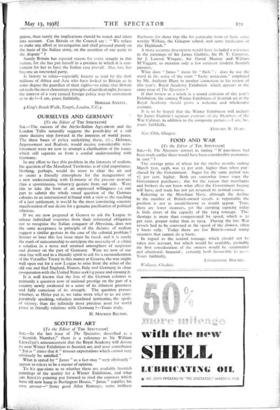FOOD AND WAR [To the Editor of THE SPECTATOR] SIR,—Is
The Spectator correct in stating " If purchases had been made earlier there would have been considerable economies in cost " ?
The average price of wheat for the twelve months endins March 31st, 1938, was 15 per cent. higher than when pur- chased by the Government. Sugar for the same period was 71 per cent. higher. Both are somewhat lower since the Government purchases ; this for the reason that merchants and brokers do not know what effect the Government buying will have, and trade has not yet resumed its normal course.
Referring to the Merchant Navy, although the decline in the number of British-owned vessels is regrettable the position is not as unsatisfactory as would appear. True, there are fewer steamers, yet the carrying capacity today is little short of the capacity of the 1914 tonnage. This shortage is more than compensated by speed, which is 20 per cent. greater today than in 1914. During the .late War vessels had to be convoyed at the speed of the slowest, often 7 knots only. Today there arc few British-owned tramp steamers that cannot do 9 knots.
In regard to the neutral tonnage, which should not be taken into account, but which would be available, probably the first consideration of the owners would be sentimental and afterwards financial ; certainly both favourable to us.— Yours faithfully,














































 Previous page
Previous page